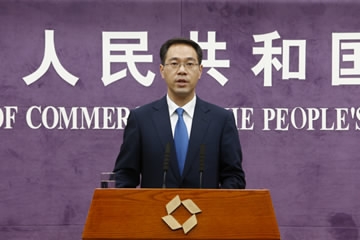
Business
15:04, 28-Jul-2017
Didi-Uber deal still under probe by China's anti-trust watchdog

One year after Didi announced to buy out Uber's Chinese operation, the transaction is still under anti-trust investigation, said a Chinese Commerce Ministry spokesman on Thursday.
Gao Feng, the spokesman, said: "The ministry is now conducting a comprehensive evaluation of the influence of car hailing companies on market competition and other sectors through seminars, field research and analysis by third-party institutions."
The ministry aims to protect fair market competition and encourage innovation in the car-hailing industry, Gao added.

Gao Feng, a Chinese Commerce Ministry spokesperson, at a daily news briefing on July 27, 2017 in Beijing. /MOFCOM Photo
Gao Feng, a Chinese Commerce Ministry spokesperson, at a daily news briefing on July 27, 2017 in Beijing. /MOFCOM Photo
This marks the fourth time that the regulator publicly responded on this deal. Yet it is not clear that whether the case has been officially filed under the country's antitrust laws.
Didi’s decision to buy out Uber’s Chinese operation would give it control of almost 90 percent of the ride-hailing market.
The odds are slim that the ministry would nix such high-profile deal involving a company adopting a variable interest entity (VIE) structure.

VCG Photo
VCG Photo
The regulator rarely touches a transaction with VIE-structured company engaged, legal and industry experts said.
What is VIE?
Variable Interest Entity ("VIE") structures were first introduced by Chinese companies listing in the US as far back as the year 2000 when SINA had its initial public offering on the NASDAQ. Effectively the VIE structure means that equity holders have a somewhat indirect financial interest in the revenue and earnings stream and do not actually have a claim on the assets of the company in question. Certain industries in China, including the internet industry, are heavily regulated and substantial foreign ownership of their assets is either severely limited or prohibited by the Chinese government. As a result, the VIE structure became a necessity for these companies to list on overseas exchanges.Although a rejection is unlikely, there is little precedent for the merger. And the ministry has held up transactions, sometimes for years, to extract the terms it desires. In this case, the regulators could push for pricing controls or find other ways to slow the pace of expansion of the new Didi-Uber company.
1km

SITEMAP
Copyright © 2018 CGTN. Beijing ICP prepared NO.16065310-3
Copyright © 2018 CGTN. Beijing ICP prepared NO.16065310-3